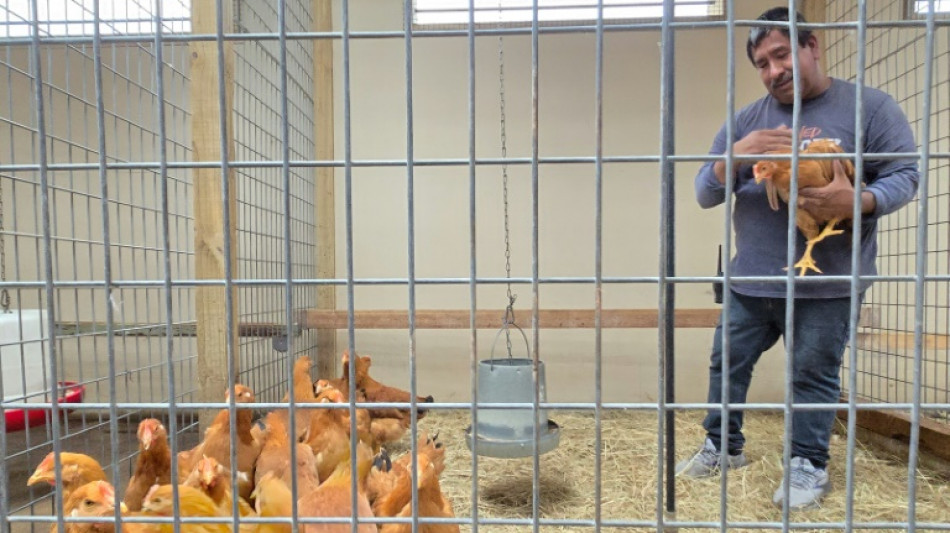
-
 Sainz opts out of race for FIA presidency
Sainz opts out of race for FIA presidency
-
Shamar Joseph rips through Australia top order in first Test

-
 Court rejects EDF complaint over Czech nuclear tender
Court rejects EDF complaint over Czech nuclear tender
-
Mbappe returns to Real Madrid training at Club World Cup

-
 Kenya anniversary protests turn violent, 8 dead
Kenya anniversary protests turn violent, 8 dead
-
Elliott double fires England into Under-21 Euros final

-
 Trans campaigners descend on UK parliament to protest 'bathroom ban'
Trans campaigners descend on UK parliament to protest 'bathroom ban'
-
New York mayoral vote floors Democratic establishment

-
 Trump claims 'win' as NATO agrees massive spending hike
Trump claims 'win' as NATO agrees massive spending hike
-
EU probes Mars takeover of Pringles maker Kellanova

-
 Sidelined Zelensky still gets Trump face time at NATO summit
Sidelined Zelensky still gets Trump face time at NATO summit
-
Mexico president threatens to sue over SpaceX rocket debris

-
 Amazon tycoon Bezos arrives in Venice for lavish wedding
Amazon tycoon Bezos arrives in Venice for lavish wedding
-
Shamar Joseph gives West Indies strong start against Australia

-
 Raducanu's Wimbledon build-up hit by Eastbourne exit
Raducanu's Wimbledon build-up hit by Eastbourne exit
-
RFK Jr.'s vaccine panel opens amid backlash over fabricated study

-
 'You try not to bump into things:' blind sailing in Rio
'You try not to bump into things:' blind sailing in Rio
-
Trump says 'three or four' candidates in mind for Fed chief

-
 Trump teases Iran talks next week, says nuclear programme set back 'decades'
Trump teases Iran talks next week, says nuclear programme set back 'decades'
-
Turkey tussles with Australia to host 2026 UN climate talks

-
 Bielle-Biarrey 'fit' for Top 14 final after suffering concussion
Bielle-Biarrey 'fit' for Top 14 final after suffering concussion
-
James Webb telescope discovers its first exoplanet

-
 Kenya's Kipyegon seeks history with four minute mile attempt
Kenya's Kipyegon seeks history with four minute mile attempt
-
Gunmen kill 10 in crime-hit Mexican city

-
 Olympic surfing venue battling erosion threat
Olympic surfing venue battling erosion threat
-
Relief, joy as Israel reopens after Iran war ceasefire

-
 Spain upholds fine against Rubiales for Hermoso forced kiss
Spain upholds fine against Rubiales for Hermoso forced kiss
-
Iran hangs three more accused of spying as fears grow for Swede

-
 Australia choose to bat first in first Test against West Indies
Australia choose to bat first in first Test against West Indies
-
Gambhir backs India bowlers to 'deliver' despite first Test misery

-
 Trump reassures allies as NATO agrees 'historic' spending hike
Trump reassures allies as NATO agrees 'historic' spending hike
-
England's Duckett says mindset change behind Test success

-
 Trump sees 'progress' on Gaza, raising hopes for ceasefire
Trump sees 'progress' on Gaza, raising hopes for ceasefire
-
UK's Glastonbury Festival opens gates amid Kneecap controversy

-
 Oil rebounds as markets track Iran-Israel ceasefire
Oil rebounds as markets track Iran-Israel ceasefire
-
Cable theft in north France disrupts Eurostar traffic

-
 Cambodians at quiet Thai border plead for peace
Cambodians at quiet Thai border plead for peace
-
Trump plays nice as NATO eyes 'historic' spending hike

-
 Barcelona announce Camp Nou return for August 10
Barcelona announce Camp Nou return for August 10
-
Trump insists Iran nuclear programme set back 'decades'

-
 Armenia PM says foiled 'sinister' coup plot by senior cleric
Armenia PM says foiled 'sinister' coup plot by senior cleric
-
Turkey breathes easier as Iran-Israel truce eases fallout risk

-
 Tesla sales skid in Europe in May despite EV rebound
Tesla sales skid in Europe in May despite EV rebound
-
'Not Test class': Pundits tear into India after England chase 371

-
 Trump whirlwind tests NATO summit unity
Trump whirlwind tests NATO summit unity
-
Justice orders release of migrants deported to Costa Rica by Trump

-
 Vietnam tycoon will not face death penalty over $27 bn fraud: lawyer
Vietnam tycoon will not face death penalty over $27 bn fraud: lawyer
-
Vietnam abolishes death penalty for spying, anti-state activities

-
 Over 80,000 people flee severe flooding in southwest China
Over 80,000 people flee severe flooding in southwest China
-
AI fakes duel over Sara Duterte impeachment in Philippines


Facing egg shortage, Americans bring chickens home to roost
A Houston poultry supply company is selling chickens like there is no tomorrow, as sky-high prices for eggs prompt some Americans to produce their own at home.
A recent US outbreak of bird flu since early 2024 is exacting a heavy toll on poultry farms. More than 21 million egg-laying hens have been "depopulated" this year so far, after 13.2 million were culled in December, according to the US Department of Agriculture.
Eggs, as a result, are a precious commodity these days.
John Berry, who manages a livestock company in Houston, reported a dramatic increase in demand for chickens as consumers grapple with the egg shortage.
"Our sales for poultry have doubled or maybe potentially tripled. I mean we're selling 100 chickens a week or more," Berry told AFP.
In times of egg abundance it would take two or three weeks to sell that many birds, he said.
A dozen premium eggs can now cost an eye-popping $10 in some US supermarkets, with even lower-grade ones now drawing twice their usual price of what is normally between two and three dollars.
The popular grocery store chain Trader Joe's is limiting purchases to one dozen eggs of any kind per household per day, and Costco is also limiting purchases.
Waffle House restaurants have slapped a 50-cent surcharge on each egg in a dish to compensate for higher costs.
Last week in Seattle, a restaurant was robbed of 500 eggs from its storeroom in the middle of the night.
- ' I have a large family' -
Berry said most of his chicken buyers are new to the world of egg production.
Such is the case of Arturo Becerra, who recently bought 10 hens for $400, with another $20 for a month's worth of feed.
On Monday, he bought five more hens, and plans to get another 10, "because I have a large family." His hens are still young and need a few more weeks to start laying eggs.
Some cities and towns in Texas allow people to raise chickens at home if they follow certain health norms.
The US Centers for Disease Control and Prevention (CDC) say the risk to the general public from avian flu remains "low," but has released safety guidelines for owners of backyard bird flocks.
The CDC also says that "people with job-related or recreational exposures to birds or other H5 virus-infected animals, are at greater risk of infection."
That has not appeared to deter Becerra.
"Now I have some place to put them, and besides, eggs are very expensive," said Becerra, a 57-year-old man who was born in Mexico. "I think it will be cheaper to buy hens and raise them."
Billy Underhill, the 62-year-old owner of a construction company and longtime chicken raiser, has bought two more of the clucking creatures.
"I just heard someone yesterday say that eggs were, like, 10 dollars a dozen," he said.
"I was already planning on buying a couple more chickens. I buy a couple every couple months because some of them die. Eventually they die and they stop laying so I'm going to keep the flow of eggs going in my family," he said.
Berry said there are no chickens to replace the millions that had to be killed because of avian influenza.
"You have to have had anticipated this and raised a thousand extra chickens or a million extra chickens," said Berry.
In the United States, the disease is affecting not just poultry farms but also dairy cows.
There have been 68 cases among people since early last year, with one of them fatal. Most of them were among people coming into contact with infected animals, according to the CDC.
The man who died was infected "after exposure to a combination of a non-commercial backyard flock and wild birds," health authorities said.
Berry said there is a generation of chickens growing and waiting to replace the ones who were destroyed. But it will take time, and as eggs store well, he recommends that people stock up.
"It'll be a couple of months, I would guess at the soonest. Seems like it's two or three months or more before things kind of get right."
I.Matar--SF-PST
